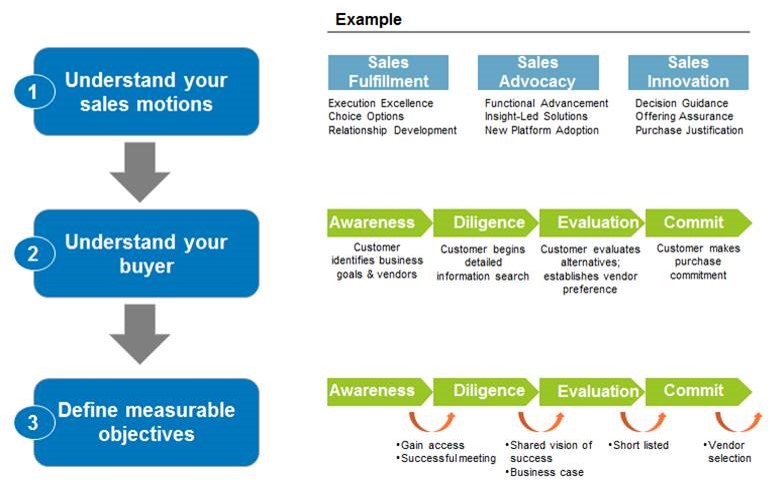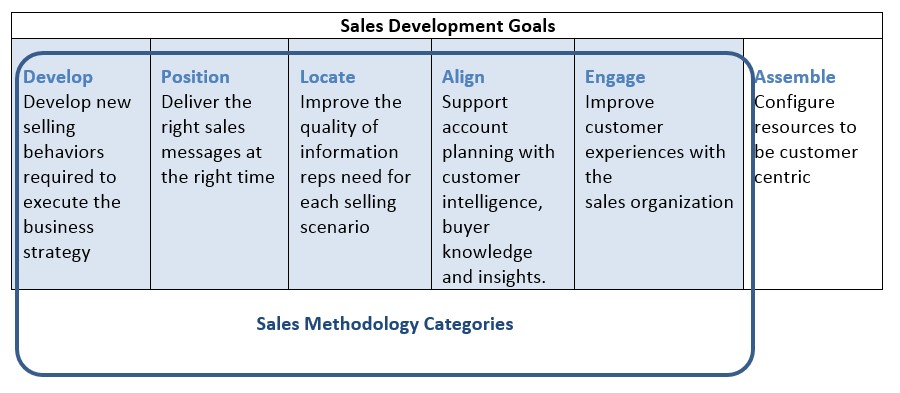Does your portfolio company need a sales methodology?

Know your sales environment first!
Revenue growth is obviously a key element to exiting a private equity investment with a healthy multiple. Increasingly, Managing Directors find themselves in need of providing portfolio companies with advice and tools on growing top-line revenue, so private equity clients naturally ask us how their portfolio companies can grow through sales excellence. Many clients have investment theses focused on the go-to-market strategy, sales model, and customer-facing roles in the organization. In this and in future posts we’ll address some of our private equity clients’ most common revenue growth questions (extending beyond the strategic theses mentioned above), including inquiries related to rep on-boarding and enablement.
Which Sales Methodology? Sales methodology is a frequent topic on which portfolio companies solicit advice. The story goes like this: “We are hiring a lot of new reps and we lack a scalable and consistent approach to onboard and ramp new reps to full productivity. While some reps don’t need any help, the majority need structure. What sales methodology should we use, and how should we deploy it?”
There are several established sales methodologies such as Miller Heiman, TAS and Customer Centric Selling (and many others). Each year new ones are born and catch the market’s attention like the latest fad or “silver bullet” to your sales woes (ever heard of the Challenger Sale?). But the task of selecting the right methodology is not that easy, and grasping for the latest trend, though tempting, is usually not the right answer.
Risks and Causes for Failure: Many companies don’t achieve the expected ROI from investments in a new sales methodology. The challenge starts with clearly defining sales force development goals and accurately defining sales methodology in a world where no standard definition exists. The framework below may help:
But sales leaders who pinpoint development goals supported by a sales methodology still struggle to benefit. Here are the most common reasons for failure:
- The chosen methodology is not a good fit for the industry in which the company operates.
- The chosen methodology does not align to the company’s sales motions (the combination of customer, message and process).
- The chosen methodology is “off the shelf” and can’t accommodate the company-specific sales development goals around Develop, Position, Locate, Align and Engage.
- The company lacked the infrastructure necessary to effectively implement and manage the sales methodology (e.g., CRM that can’t automate components of the methodology).
- Limited reinforcement by sales leadership, first line managers and ongoing training.
Sales leaders clearly need to carefully evaluate different options based on need, fit and cost but may not know where to start. Hint: it shouldn’t start with vendor research!
Step One: Know Your Sales Environment: The number one factor, and where most companies fall down, is first understanding your sales environment. While “off the shelf” solutions are great, without context, they can do more harm than good. The right methodology differs by company, but the process for selecting the right methodology shouldn’t. It starts with internal-facing homework geared towards the documentation of the company’s unique sales environment. Use the following steps:
a) Understand your sales motions. Sales motions, the combination of customer, message and process (notice what is conspicuously missing here … “product”), range from services-oriented fulfillment models to innovative models that entail joint ideation and custom solutions with the customer. Companies who don’t understand their sales motions risk adopting a sales methodology that is over- or under-engineered. And, most companies have more than one sales motion, so forcing a uniform methodology across the entire sales organization rarely works well.
b) Understand your buyer. Create a framework that organizes all of the activities customers must perform to successfully achieve their desired output — independent of your products or services. Then break down the customers’ problem-solving processes into a set of logical decision gates required to advance from one decision stage to the next. Lastly, identify the level and frequency of seller engagement that customers require.
c) Define measurable objectives to oversee and inspect the sales process. For example, critical milestones that demonstrate sales progression could include: 1) gain access, 2) successful meeting, 3) shared vision of success, 4) business case, 5) short-listed, 6) vendor selection.

Step Two: Consider what sales methodology(ies) is right for your business. Having completed the above exercise, you will be well equipped and informed as you embark on the sales methodology evaluation and selection process. A clear picture of your sales environment is crucial: it forms the basis from which the hard questions can be asked. The right fit will be evident from vendors who clearly explain how their methodology adds value to your company’s sales environment (defined by sales motion, buyer process and measurable sales objectives).
Caution! Companies who complete the aforementioned internal-facing homework may still struggle to find a sales methodology that works for them. Many vendors have “customizable” methodologies, but let’s face it: every company’s sales environment is unique. Your sales reps know the sales environment best, so involve and leverage them in the process. Some of our clients, often after frustrating and unsuccessful external searches, form an internal taskforce consisting of “A” players chartered with building a homegrown methodology that more fully addresses the nuances of the company’s sales environment. There is obviously risk to this approach as well. The effort can require significant time, and taking reps out of the field impacts overall sales performance. But the short-term risk can be offset by the long-term benefit of having a truly customized sales methodology that improves rep productivity and scales with sales force growth.
Are your portfolio companies looking for sales growth advice? Are sales methodologies one of their pressing questions? How can AGI support your goal of generating strong ROI from portfolio companies?
